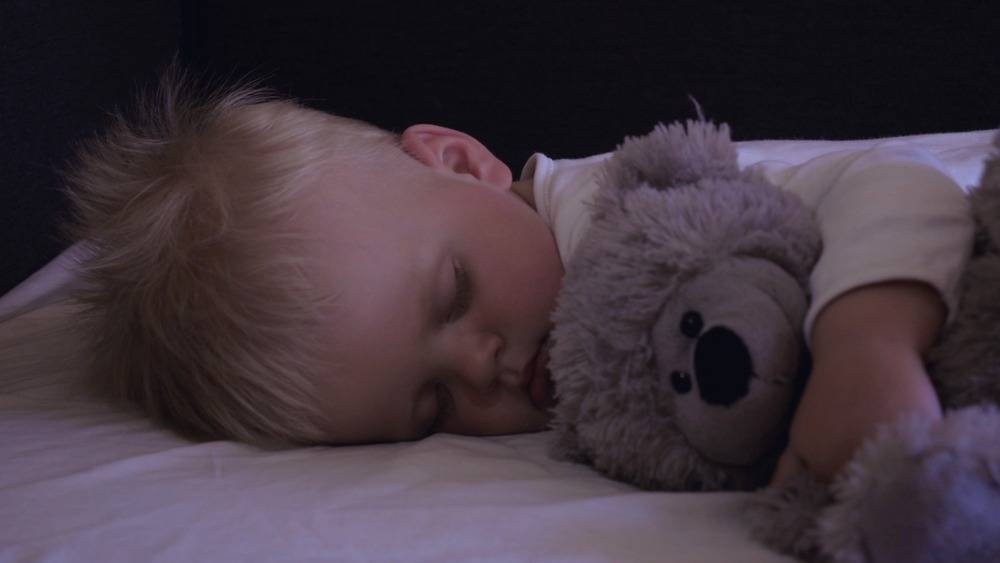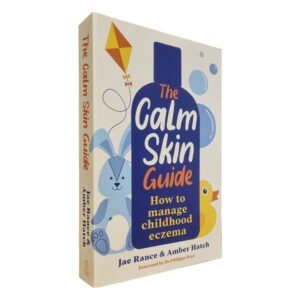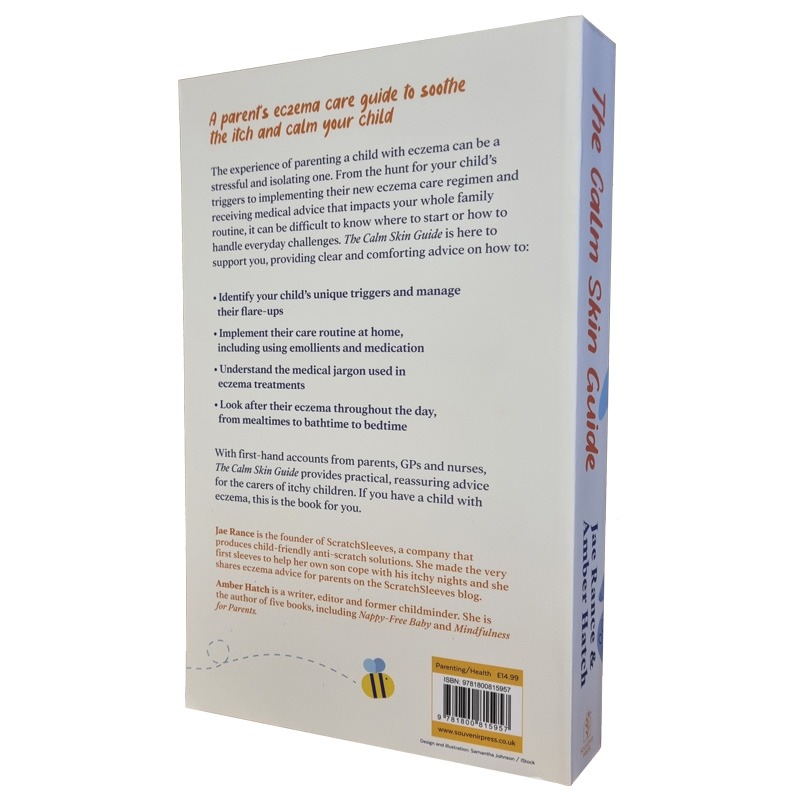Scratching and disturbed sleep in eczema babies and kids



Ask any eczema parent which part of their child’s eczema they find hardest to deal with and the answer will invariably be sleep, or rather lack of it. Childhood eczema and the associated itching and scratching commonly affects the sleep of the whole family. A survey conducted by the National Eczema Association in the US found that 60% of eczema parents are waking up more than twice a night to provide care1. We look at the importance of sleep and how to minimise the eczema itch and inevitable scratching that disturbs it.
Importance of sleep
We all appreciate the benefit of a good night’s sleep and how a bad night’s sleep can impact how effective we are the following day. So it’s no surprise that around 70% of eczema caregivers feel that their child’s eczema is negatively impacting their ability to work and enjoy life1. To make things worse, infantile eczema commonly appears at around 3-4 months old, just when other babies are starting to sleep for longer periods. It just feels so unfair.
Sleep is hugely important for brain development in babies and children. Numerous studies have demonstrated that poor sleep, especially during early childhood is associated with problems with memory, cognition and anxiety in later childhood and on into adult life2. The eczema itch makes it hard for little ones to fall asleep and more likely that they will wake as they come to the top of each sleep cycle. Teaching an eczema child good sleep habits will stand them in good stead for the rest of their lives. It’s never too early to start. But don’t panic if your child is older, it’s never too late either. You can read one eczema parent’s eventual sleep success story here.

Establishing good sleep habits
A good night’s sleep starts long before bedtime. Make sure that your child has had plenty of exercise and stimulation during the day. This will ensure that they are ready to sleep. But don’t let them get over tired, as this makes it harder for them to fall asleep. Read our article on wake windows for more information on this.
The bedtime routine is hugely important. Doing the same things in the same order every night will mean that your child understands that it’s time for bed. This is a sequence rather than a schedule. It doesn’t have to start at exactly the same time and take the same amount of time every night. That said, keeping to a fairly regular schedule can be beneficial but be ready to adjust the times as your child gets older.
Most bedtime routines include bathtime. With eczema kids, this may not always be appropriate. Some eczema responds well to daily baths, some doesn’t. If your child really struggles with bathing, it is probably best to do this in the morning. Instead, build your own your routine around your child’s evening skincare routine. Getting this routine right will minimise itching and increase the chances of them being able to drift off to sleep. If you need to leave a break between creams, fill it with stories or not-too-exciting play (with parents but without screens).
Once your eczema child has been tucked up for this night, it is almost inevitable that they will wake up at the top of each sleep cycle and struggle to settle themselves. You will need to help them go back to sleep and make sure that they aren’t scratching. When you go to settle them back to sleep it’s important to meet but not exceed their needs. It’s likely that you will need to apply more cream or adjust their clothing to get them comfortable. Make sure that this is all you do. Minimise interactions, keep the lights as low as possible and leave as soon as their needs are met. Easier said than done, but this approach really does pay off in the long term.
Scratching and sleep
Leaving an eczema child to drift off to sleep by themselves can be very stressful for parents. Over 80% of eczema caregivers worry about their child’s eczema symptoms while they are away from them1. Most of this worry is over scratching. Balancing the risk of scratching damage with the benefits of learning good sleep habits is tricky. It really is a case of trial and error.
A good bedtime skincare routine is key to ensuring that your little one is as comfortable as possible before you tuck them into bed. Making sure that your child is tired but not over-tired will ensure that they can fall asleep quickly. You can out more on this here. Using a good quality set of stay-on scratch mitts or eczema PJs can give a lot of reassurance to both parent and child.
When babies and young children wake in the night, it’s likely that you will need to take action to relieve the itch. Perhaps apply more cream, adjust their bedding or give them some antihistamine. That said, try not to go to them as soon as you hear them. It’s normal for little ones to rouse every 30-45 minutes and they may well drift back to sleep. So long as their hands are covered, any scratching won’t do much damage. Going in unnecessarily during this time, risks teaching your child that it’s okay to wake you up in the middle of the night.
Older children can often settle themselves with distraction techniques or physical actions like tapping the itch. However, they will need help learning these techniques. You can find out more here.
More about itching (and scratching)
It’s useful to know that there are two types of itch. The physical itch is the feeling when the nerves in the skin are irritated. The psychological itch occurs when you think about something itchy. Both types of itch are equally itchy and just likely to have you scratching – just thinking of head lice will have most people scratching their heads. Once your little one starts to feel itchy, just feeling itchy can make the itching worse.
- It’s also completely normal to feel more itchy at night for a number of reasons.
- Body temperature and the blood flow to the skin both increase in the evening. Both of these factors warm the skin, making it more sensitive.
- This increase in skin warmth also means that it loses more water at night. Dry skin tends to be more itchy.
- At night, the body releases more cytokines, which increase inflammation. Meanwhile, the production of corticosteroids – hormones that reduce inflammation – slows.
- During the day, distraction often means that itching is less noticeable. At night, with nothing else to think about, the itch comes back to the fore.
You can find out more about the mechanics of itching here.
Understanding the scratch-itch cycle
Just as thinking about an itch can make it worse in the short term, scratching an itch can make it worse as well. While scratching feels really good all the time you are scratching (it triggers a release of serotonin which feels good in a moment), it also releases inflammatory chemicals in the skin. These inflammatory chemicals disrupt the skin barrier, creating a new itch to scratch. Added to this, we all know from childhood just how itchy healing scabs can be. Any scratches that break the skin’s surface will itch for days as they heal up.
By minimising scratching, you are also minimising itching. Controlling the scratch-itch cycle is easier said than done, but it is definitely worth the effort. The starting point is a good skin care routine. Emollients and, when necessary, steroid creams are key to this. It can take a while to find an emollient that works for you and your child as different formulations suit different people.
With small babies, holding hands away from their face, keeping nails short and swaddling or scratch mitts will generally minimise any scratching damage. As children get older distraction, especially with something that keeps their hand busy, is often effective. This is true for both during the day and bedtime. Fiddle toys or squishies are great for both situations. Once children start to understand cause and effect, at around 3-4.5 years teaching them to tap an itch or find a cold pack can be effective.
Scratching can easily become a habit that aggravates eczema and prevents the skin from healing properly. Prolonged, habitual scratching typically results in thickened, or lichenous, eczema patches. These are itchy and often very prominent, opening children up to unwanted questions and teasing. So it really is important to get to grips with it as soon as possible. If your child has already developed a scratching habit, the habit reversal technique has been shown to be effective for eczema sufferers.
This is the round-up article for our Sleep and Scratching topic. You can find more articles on this subject by following the links in the text or by scrolling through the articles below.
Our references:
- https://nationaleczema.org/blog/caregiver-burden-of-atopic-dermatitis/
- https://www.ncbi.nlm.nih.gov/pmc/articles/PMC6738636/
Here at ScratchSleeves, we don’t just write about our family’s eczema experiences, we also manufacture and sell our unique stay-on scratch mitts and PJs for itchy babies, children and adults. For more information visit our shop.
The Calm Skin Guide
Love our blog? It's also available in book format with:
- First hand accounts from parents & medical professionals
- Easy navigation
- Comprehensive index
- Additional material
Signed copies available at no extra cost
Written by:
Interesting article? Don't keep it to yourself...
Read next...
You may also find helpful...
Quick buy


Multi Buy Discount

Spend between £30 - £60 and save 5%
Spend between £60 - £120 and save 10%
Spend over £120 and save 15%
Discount automatically applied at checkout
No Quibbles Guarantee

ScratchSleeves abide by a no quibbles guarantee.
Free UK Postage

Free packing and postage on all UK orders. For overseas orders to Europe postage is from £3.50, to USA is £6.50 and to the rest of the world, from £3.75.






